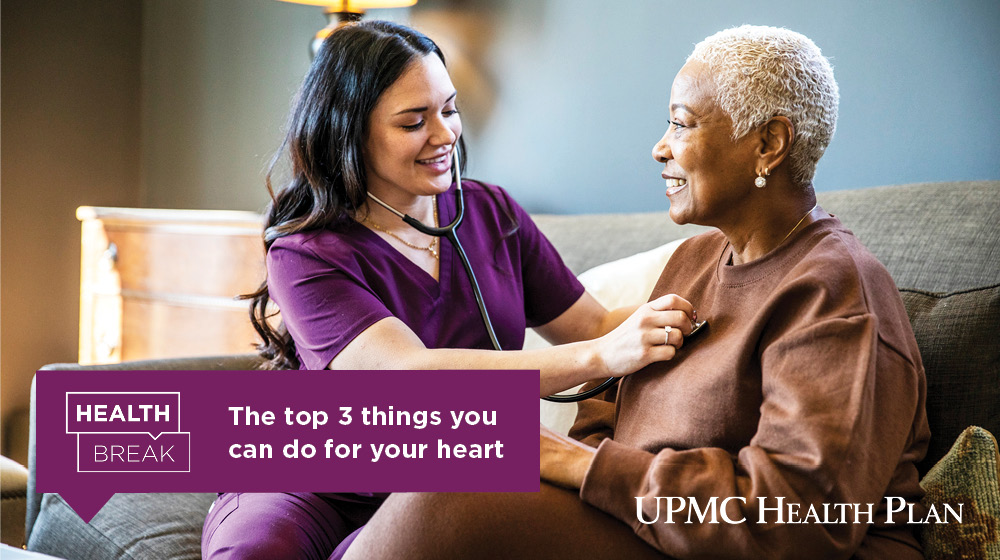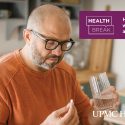Health Break: The top 3 things you can do for your heart

A podcast for UPMC Health Plan members, Health Break is your quick guide to caring for your mental and physical health, prioritizing wellness, and making the most of your health insurance plan.
Episode 12: Take a Health Break with Dr. Cynthia Rosenberg
Dr. Rosenberg takes a Health Break with us to outline what matters most when it comes to having a healthy heart. She also talks about preventive measures we can take to support our heart health at any age.
Episode transcript:
Camille: Welcome to Health Break by UPMC Health Plan, your quick guide to health, wellness, and how to make the most of your health insurance plan. Listen during your coffee break, lunch break, or anytime you need a break. I’m your host, Dr. Camille Clarke-Smith. I help to oversee the quality of the plans we offer at UPMC Health Plan.
Alex: And I’m your co-host, Alex Treanor. I’m a senior health coach who works with our members on healthy lifestyle habits and goals. This is your… Health Break.
Alex: Hi everyone! I’m Alex Treanor. Today Dr. Cynthia Rosenberg tells us the top three things we can do to support our heart health.
Dr. Rosenberg, thank you so much for joining us today.
Dr. Rosenberg: I’m so happy to be here, thank you.
Alex: To get started, can you tell us what makes heart health so important?
Dr. Rosenberg: As you probably know, the heart is very, very important to our health. The question is why, why is it so important? The very most important part actually of our entire circulatory system, the heart is responsible for pumping blood around to every cell in our body and delivering oxygen and nutrients so that we can stay healthy. So, we always want to have as healthy of a heart as possible. I’m sure you know, as do others and many people, that it’s possible to have certain parts of our body surgically removed or hurt in some kind of other way in an accident and still be perfectly fine. Many people, for example, have had their gallbladders removed, but the heart is not one of those parts of the body. So we really do have to, as much as we can, keep our heart healthy. And to focus on those factors, those things that are more or less under our control, that we can do something about, positively do something, to impact our heart and to maximize having a healthy heart.
Alex: Our heart is definitely essential to good health. What are some things that we can do for a healthy heart?
Dr. Rosenberg: Well, the most important thing I believe to remember in this regard is that our heart is basically a muscle. It’s a muscle like any other muscle in our bodies. So we all know if we don’t exercise our legs, they get weak, we can’t walk as well. If we don’t exercise the muscles in arms, we can’t lift things up. The same is true of our heart. Now our heart, unlike other muscles, may not necessarily be at rest because it has to pump blood on a continuous basis. In fact, when our hearts stop, we’re no longer living. So the heart is always working, but like other muscles, it’s important to exercise that heart, to exercise that muscle so that it can function as well as it possibly can. The way to do that is really through a type of exercise called aerobic exercise, or cardiovascular or cardio exercise.
And these are the exercises that we hear about typically [when] we’re either researching or talking to people or talking to our provider about how to stay healthy. Things like walking, jogging, swimming, biking, the kind of things that many people do for pleasure. These exercises help to push our heart a little bit so that it can stay healthy. These exercises are also very good for many other reasons, like keeping stress down, keeping our blood sugar down, et cetera. This is not to say that weight training can’t also be good for our cardiovascular system, but if we’re going to do one thing for our hearts, that would be the aerobic exercising.
The second thing that’s very, very important really would be to eat a healthy diet. If you think of your heart as pumping blood around through your arteries around your body, if those pathways, if those arteries, and the arteries are also in the heart, if the heart itself gets clogged up or if these arteries get clogged up, that is not a good thing—resulting in heart disease, high blood pressure, et cetera. So we don’t have time to talk today about all the ways to eat a healthy diet, and there are many, but essentially focusing on some things that really aren’t so good for the heart—things that are heavy in fat and, you know, fast foods and things like that. And if we can, eating more healthy vegetables, fruits, et cetera.
The third thing would be to know your risk factors and understand what your risk factors are for heart health, for having any heart problems. I’ve mentioned earlier that some people have a higher risk based on genetic predisposition. It’s important to know that, not that it’s an inexorable thing, but just if there is a lot of heart disease in your family, you might pay more attention and do make sure that you talk to your provider about that.
There, in addition, are a number of other conditions like high blood pressure, diabetes, for example, high cholesterol, which can in fact negatively impact the heart. It’s all kind of together, but also can impact the heart and those conditions can be and should be managed well, both for the conditions themselves and for their impact on the heart. I’d say that in summary on that point, it’s very important to see your provider on a regular basis, in particular if you have any conditions, such as the ones I’ve mentioned, or if you have any symptoms of heart problems. And finally, and this goes without saying, if you smoke, please talk to your provider about stopping smoking and how you can stop smoking, which is very bad for your health in general, and also for your heart, and use alcohol only in moderation.
Alex: That makes a lot of sense. I’m curious, is there one thing that people don’t usually think of when it comes to heart health?
Dr. Rosenberg: I’d say that most people, most adults, are very familiar with the most common symptoms of heart problems—whether they’re chronic heart problems or an acute heart problem, like a heart attack. Things like knots in the chest, sweating, and pounding in the chest, or feeling like there’s an elephant sitting on my chest. We hear these in the movies. We see these on television. Most people, if they had those symptoms, would be alarmed and seek help. But there are also many atypical symptoms of which can signal heart disease, and these are not quite as atypical as the nomenclature might suggest. Things like indigestion, nausea, heartburn, shortness of breath, pain in our jaw, back, or even just feeling very fatigued without any precipitating event. All of these can—they don’t necessarily mean, but they can—signal heart disease.
So should you be feeling any of these symptoms, it would also be very important to talk to your provider and please I would absolutely ask that you don’t hesitate to do that. Many people think these are more common in women than in men—and they’re slightly more common in women, these atypical symptoms—but many, many, many men experience these as well.
So I guess in summary, what can you do to keep your heart healthy? You can try to quit smoking; talk to your provider about that. And many, many providers will be more than happy to help and support you in that regard, and use alcohol in moderation. And in addition to that, exercise, the kinds we’ve talked about, eat a healthy diet, and see your provider on a regular basis and should you have any symptoms.
Alex: Thank you so much, Dr. Rosenberg, for taking a Health Break with us today.
Dr. Rosenberg: Thank you.
Alex: Learn more about heart health on the UPMC MyHealth Matters blog.
Find show notes and more information at upmchealthplan.com/podcast. Join us as we explore other health and wellness topics in the next episode of Health Break.
This podcast is for informational and educational purposes. It is not medical care or advice. Individuals in need of medical care should consult their personal care provider. Views and opinions expressed by the hosts and guests are solely their own and do not necessarily reflect those of UPMC Health Plan and its employees.
Related to this episode:
- Heart healthy foods
- Lifestyle changes for a healthy heart
- Preventive screening guide for UPMC Health Plan members
About Dr. Cynthia Rosenberg:

Dr. Cynthia Napier Rosenberg is the chief medical officer for UPMC Health Plan Medicare and Special Needs Products. In this role she is responsible for the medical direction, clinical leadership, and oversight of these programs.
Dr. Rosenberg has over 25 years of professional experience in a wide variety of payer and provider settings, including health care insurance, disease management, government programs, medical education, hospice, long-term care, and clinical practice. She has also developed educational programs and outreach related to the senior population for newspaper, radio, and television. Her special interests include population health, social determinants of health, behavioral and physical health integration, and health care for the frail, elderly, and other vulnerable populations.
Dr. Rosenberg received her medical degree from the University of Pittsburgh. She also received a Master of Arts degree in English Language and Literature from the University of Michigan and additional graduate training in business administration at the University of Pittsburgh Katz Graduate School of Business. She is board certified in family medicine and geriatrics.
About Dr. Camille Clarke-Smith:

Camille Clarke-Smith, EdD, is a program director in the Quality Improvement, Medicare Stars Department at UPMC Health Plan, where she leads the Medicare Faith and Wellness Program, a 3- to 12-week health and wellness challenge. She is also the founder of the nonprofit Transforming the Health of African American Women (THAW) Inc. She earned a doctorate in health and physical activity education from the University of Pittsburgh in addition to a master’s in exercise science and a bachelor’s in psychology and sociology. She is currently pursuing her master’s degree in social work at Carlow University.
About Alex Treanor:

Alex Treanor is a lead health coach at UPMC Health Plan. As a lifestyle health coach, she specializes in helping you lose weight, eat healthy, get more physical activity, be less stressed, and quit tobacco. Alex has a master’s in Kinesiology, Integrative Wellness from Point Loma Nazarene University. She has been coaching since 2014 and is a Nationally Board Certified Health & Wellness Coach and Certified Personal Trainer. Alex is passionate about helping people improve their relationship with food and exercise while creating healthy, sustainable routines filled with enjoyment. Alex enjoys spending time with her husband, walking with her dog, and eating tacos in the sunshine.



